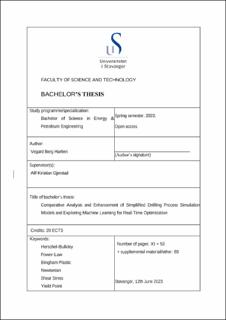| dc.contributor.advisor | Gjerstad, Alf Kristian | |
| dc.contributor.author | Harlem, Vegard Berg | |
| dc.date.accessioned | 2023-08-02T15:51:26Z | |
| dc.date.available | 2023-08-02T15:51:26Z | |
| dc.date.issued | 2023 | |
| dc.identifier | no.uis:inspera:129762885:22419295 | |
| dc.identifier.uri | https://hdl.handle.net/11250/3082361 | |
| dc.description.abstract | Real-time optimization of drilling processes is vital for the efficient and safe operation of the oil and gas industry. For this, fast and robust models are required to enable automation safety strategies. Many existing models are computationally intensive while requiring executions speeds decades faster than real-time for certain automation tasks. This thesis aims to understand what makes models computationally intensive, compare solutions and propose alternatives, as well as look at accuracy where simplifications are made.
The research framework involves two models developed in MATLAB, by Alf Kristian Gjerstad and Kjell Kåre Fjelde, as a starting point. The primary tasks include analyzing the differences between the models mainly aimed at calculation of frictional pressure loss, evaluating the reasons for these differences, modifying the models to suit the needs of this thesis, and adding options for the calculations in the main model, by Alf Kristian Gjerstad.
This thesis presents a thorough investigation of the discrepancies between the two models, along with implementations and modifications to the main model. A Machine Learning-based approach is proposed as an alternative to the more computationally intensive versions using Herschel-Bulkley and Bingham Plastic, to maintain real-time applicability while hopefully maintaining accuracy. The results demonstrate the potential of the proposed alternative. | |
| dc.description.abstract | Real-time optimization of drilling processes is vital for the efficient and safe operation of the oil and gas industry. For this, fast and robust models are required to enable automation safety strategies. Many existing models are computationally intensive while requiring executions speeds decades faster than real-time for certain automation tasks. This thesis aims to understand what makes models computationally intensive, compare solutions and propose alternatives, as well as look at accuracy where simplifications are made.
The research framework involves two models developed in MATLAB, by Alf Kristian Gjerstad and Kjell Kåre Fjelde, as a starting point. The primary tasks include analyzing the differences between the models mainly aimed at calculation of frictional pressure loss, evaluating the reasons for these differences, modifying the models to suit the needs of this thesis, and adding options for the calculations in the main model, by Alf Kristian Gjerstad.
This thesis presents a thorough investigation of the discrepancies between the two models, along with implementations and modifications to the main model. A Machine Learning-based approach is proposed as an alternative to the more computationally intensive versions using Herschel-Bulkley and Bingham Plastic, to maintain real-time applicability while hopefully maintaining accuracy. The results demonstrate the potential of the proposed alternative. | |
| dc.language | eng | |
| dc.publisher | uis | |
| dc.title | Comparative Analysis and Enhancement of Simplified Drilling Process Simulation Models and Exploring Machine Learning for Real-Time Optimization | |
| dc.type | Bachelor thesis | |
